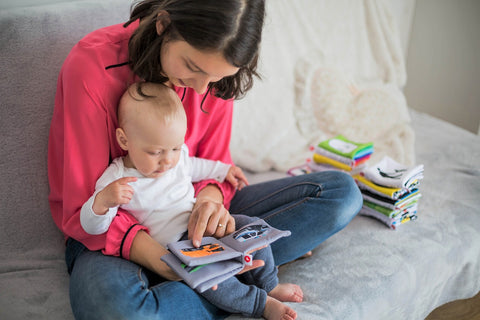Understanding the Science of Bonding: Building Strong Connections with Your Baby
The bond between a mother and her baby is a remarkable and complex phenomenon that goes beyond mere emotional attachment. Understanding the science behind this bond can deepen our appreciation for its importance in a child's development. In this article, we will delve into the fascinating science of bonding and explore how it shapes the relationship between a mother and her baby.
The Biological Basis of Bonding:
The science of bonding reveals that biological processes play a significant role in forming the mother-baby bond. During pregnancy, the hormone oxytocin floods the mother's system, facilitating labor, breastfeeding, and bonding. Oxytocin, often referred to as the "love hormone," promotes feelings of trust, attachment, and maternal instincts. It enhances the mother's emotional connection to her baby and fosters a sense of protection and nurturing.

The Role of Brain Development:
The science of bonding highlights the impact of this special connection on the baby's brain development. Studies have shown that secure attachment stimulates the release of neurotransmitters, such as dopamine and serotonin, which are crucial for healthy brain development. The mother's responsive interactions with her baby trigger the release of these neurotransmitters, promoting neural pathways that support emotional regulation, social skills, and cognitive abilities.

Attachment Theory:
Attachment theory, pioneered by psychologist John Bowlby, provides further insights into the science of bonding. According to this theory, a secure attachment between a mother and her baby forms the foundation for healthy emotional and social development. When a baby experiences consistent and loving care, their brain develops a secure internal working model, shaping their expectations of relationships throughout life.

The Impact on Emotional Well-being:
Understanding the science of bonding helps us appreciate its profound impact on a baby's emotional well-being. Securely attached babies develop a sense of safety and trust, which allows them to explore the world with confidence. The emotional connection with the mother provides a secure base from which they can explore, take risks, and develop resilience. This foundation of emotional security nurtures positive self-esteem, emotional intelligence, and a healthy sense of self.

Promoting Secure Attachment:
By understanding the science of bonding, parents can actively promote a secure attachment with their baby. Responsive parenting, where the mother consistently meets the baby's needs, fosters a sense of security and trust. Skin-to-skin contact, eye contact, and engaging in reciprocal interactions, such as talking and singing, all contribute to the formation of a strong bond. Additionally, seeking support from partners, family members, or professionals can provide guidance and reassurance during the bonding process.

In the end, understanding the science of bonding illuminates the fascinating connection between a mother and her baby. From the biological basis of bonding to the impact on brain development and emotional well-being, this bond is deeply rooted in science. By recognizing the importance of responsive and nurturing care, parents can actively promote a secure attachment with their baby, laying the groundwork for a healthy and thriving relationship. Embracing the science of bonding allows us to appreciate the profound impact we have on our children's lives and underscores the significance of the mother-baby bond in shaping their future.








